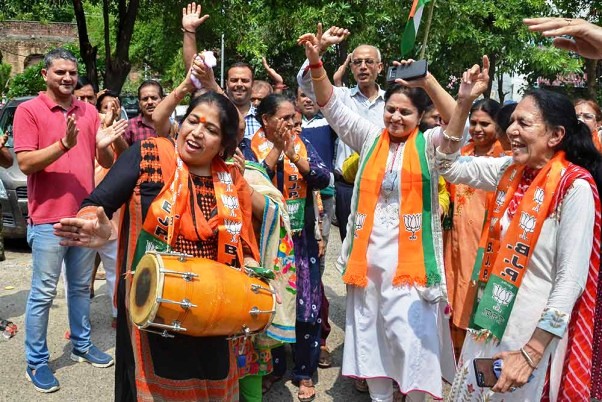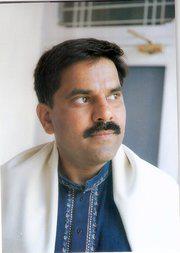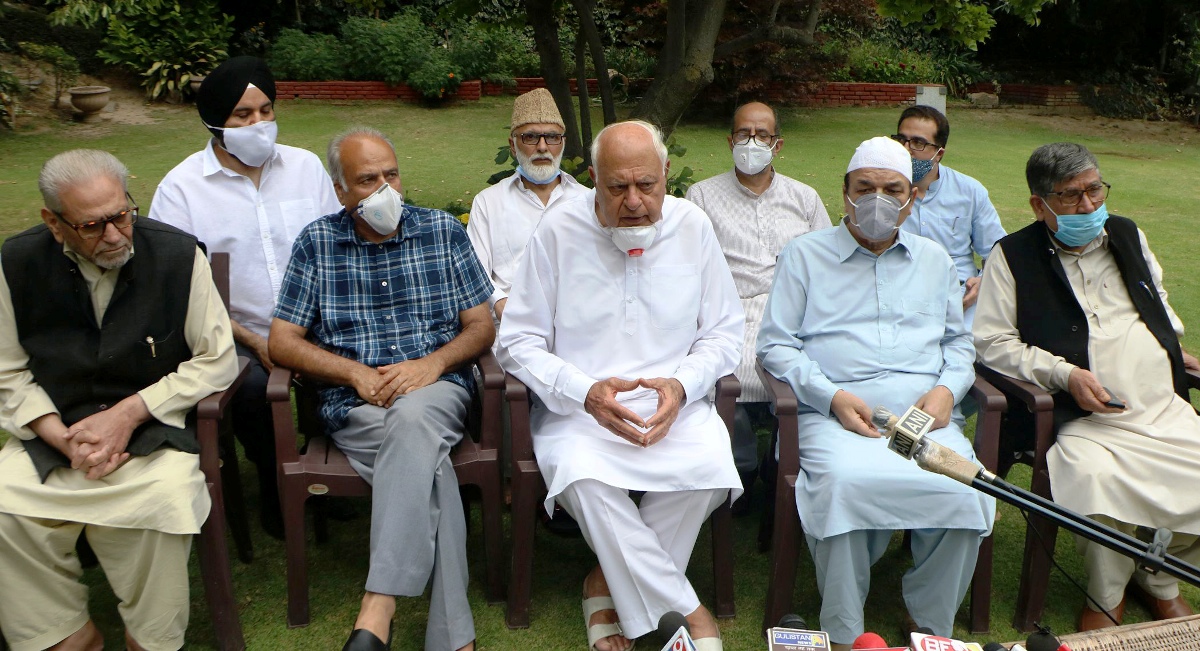There is a fundamental difference in the way Kashmir and Jammu view the constitutional changes of August 5, 2019, and the subsequent measures writes Riyaz Wani

The revocation of Article 370 that granted Jammu and Kashmir its autonomous status under India’s constitution has deeply alienated Kashmir but it hasn’t made Jammu happy either, nor even Ladakh, now a separate union territory.
Though fewer statements have emanated from the non-BJP leaders in Jammu over the last year, they have made no secret of their unease at the prevailing state of affairs. More so, after centre passed domicile laws that has opened Jammu and Kashmir to settlement by outsiders.
“There is unease in Jammu. Our demography, culture and identity are getting diluted. Yes, the issue of jobs is already there. We are being deprived of jobs,” the leader of Panther’s Party, Harshdev Singh said. “People have been opposing it. Youth, in fact, students have opposed it vociferously. Also, because of restrictions in place due to Coronavirus pandemic, people are not able to come out. Another thing is that people are being suppressed, and taken to jails, so they hesitate to express themselves. There is no democracy in J&K”.
The anxiety in Jammu is also underlined by the palpable erosion of the support for the BJP that had swept the last election in the province. Singh had won public applause when he staged a solo protest against the law, so had other opposition leaders from the region including those owing allegiance to the newly floated Apni Party.
On Social Media
Besides, the social media threads from the region highlighted a deep resentment against the domicile law, particularly about the rule on jobs that had initially only reserved fourth class jobs for Jammu and Kashmir residents. This forced the BJP leadership in Delhi to review the rules in regard to jobs.

This temporarily calmed the anger in the Hindu majority belt of Jammu province. While the people welcomed the concession on jobs, it isn’t still clear how they will respond to implications of the law on buying of the land by outsiders eligible for a domicile status now. More so, when Jammu is expected to be most affected by the implementation of the law, as people from outside the Union Territory will find it safer and culturally favourable to settle in the province. The new law has already granted citizenship to around West Pakistan refugees, Gurkhas and Valmikis, most of whom live in Jammu.
Around the time of the passing of the domicile rules, some people from Jammu had taken to Twitter to vent their frustration at the new law.
“This new domicile law is making me feel like we people of Jammu and Kashmir are screwed, we are literally screwed,” one Shivani Sharma had tweeted.
“Thankyou @PMOIndia for deceiving us the natives of Jammu and Kashmir u.t we’ve given our all for this state and in return what we got? The best return gift. Folded hands #domicilelaw,” wrote one Jiya Sethi on Twitter.
Restraint
However, one thing that is believed to have restrained the public expression of the growing unease in the province over the far-reaching post Article 370 developments is its rivalry with Kashmir. There is a fundamental difference in the way Kashmir and Jammu view the constitutional changes of August 5, 2019, and the subsequent measures: The majority community in Jammu, by and large, supports the repeal of Article 370 and the bifurcation of the state into union territories of Jammu and Kashmir and Ladakh.
Also, Jammu is willing to wait for the restoration of the statehood until the completion of delimitation exercise that is supposed to bring Jammu’s electoral status on par with Kashmir Valley. Jammu thus hopes to be an equal stakeholder in the governance of the region and subsequently, if the demographic changes are successfully brought about, become a majority partner in a future government. So, Jammu’s interest is best served by welcoming the revocation of Article 370 – and countenancing some form of demographic change, preferably, if it is done in Kashmir – and crib at the aspects of the domicile rules that directly impact it.
Jammu Versus Kashmir
The history of the divide between Kashmir and of Jammu goes back to the pre-partition days. In fact, its seeds were sown in the 1930s with Kashmiri uprising against the Dogra rule which in 1947 culminated in the transfer of political power to the Muslim majority.
Though the Kashmiri movement against Maharaja Hari Singh wasn’t essentially communal in nature, the fact that it was a predominantly Muslim uprising against a Hindu ruler from Jammu gave it a simultaneous regional religious dimension. And the loss of political power in the post-47 democratic dispensation headed by Shiekh Mohammad Abdullah only accentuated the divide. Jammu Dogras harboured a deep sense of political marginalization which resulted in the growth of the religious outfits like Praja Parishad in 1947.

The Parishad spearheaded the opposition to Kashmiri dominance in 1949. The outfit declared its opposition to the separate constitution and the national flag for Jammu and Kashmir as also the Article 370, which granted Kashmir a special status and forbade the owning of land by the non-state subjects. Parishad was also stridently opposed to Sheikh Abdullah’s National Conference which it thought only represented the aspirations of Kashmiri Muslims. Sheikh was accused of Muslimising the state through his Kashmir centric policies. In fact, the party created a huge disturbance in Jammu in the fifties when a National Conference flag was hoisted at a local college.
Praja Parishad, however, merged with the Bhartiya Jana Sangh in 1970, but the very localized nature of the grievances in Jammu later found expression in the growth of the regional outfits like Jammu Mukti Morcha around 2000. An apolitical organisation, JMM stood for the trifurcation of J&K state. It argued that this was important to resolve the Kashmir issue and end the sense of deprivation and identity crisis of the people of Jammu and Ladakh regions. The trifurcation of the Jammu and Kashmir, the party then contended, will not only localise the area of strife but counter the Pakistan propaganda that the entire Jammu and Kashmir is in turmoil and the entire population of Jammu and Kashmir harbours a grudge against India. The JMM also advocated statehood for Jammu and Union Territory status for Ladakh. Two decades, except for the statehood for Jammu, almost a similar arrangement has come to pass.
Though Kashmir has also had its due share of religious parties, most prominent of them being the Jamaat-i-Islami, they have generally defined their politics more by a strident anti- Delhi agenda rather than an anti-Jammu sentiment. The 1947 communal bloodbath in Jammu which resulted in the migration of a substantial number of Jammu Muslims to Pakistan has, however, been a sore point with Kashmir’s political parties, more so with religious groups.
The Twin Commissions
It is not that there have been no efforts to redress the regional grievances. In fact, in 1967 and 1979 the then state Governments had set up the Ganjendragadkar and Sikri Commission to inquire into the complaints of regional discrimination respectively. One result of Ganjendragadkar commission was the division of Jammu and Kashmir University into separate Kashmir and Jammu universities.
The sentiment in Jammu, however, hasn’t been entirely anti-Kashmir. The Muslim majority districts of the province like Doda, Poonch, Rajouri have been close to Kashmir, even though not as strident in their demands. In fact, the districts in past have also been rife with the secessionist militancy and with muted murmurs of separatist politics.
The ongoing turbulence in the former state though essentially grounded in the fallout of the revocation of Article 370 and its attendant complexities has also ended up feeding into the old regional rivalry. However, with religion and the power balance rather than the political grievances at the heart of the current friction, the scars on the state’s polity are expected to be deep and far-reaching.















